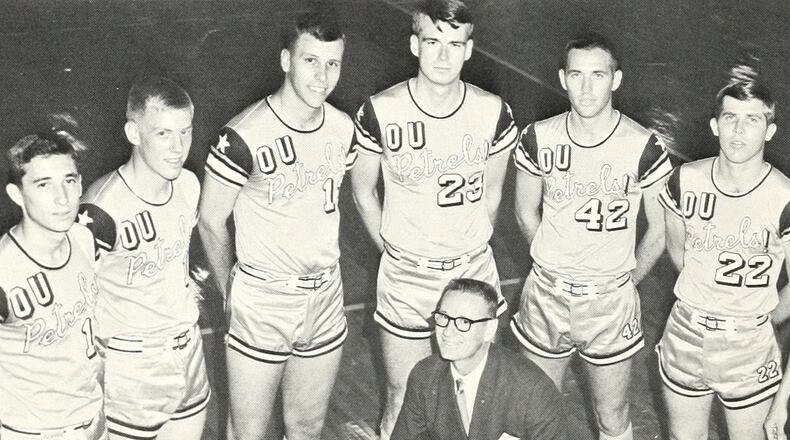The gymnasium at Oglethorpe University was overflowing with fans Dec. 29, 1961 to watch a basketball game between the Stormy Petrels and Rhode Island. It was particularly notable because Rhode Island featured Charles Lee, an all-conference player who averaged 23 points. Lee also happened to be Black.
Credit: Oglethorpe University
Credit: Oglethorpe University
The man who set up the game was Garland Pinholster, the Oglethorpe coach, who was brought up in rural Clyattville, Ga., near the Florida border and raised to see beyond skin color. A year earlier Pinholster had the foresight to make the arrangements, knowing it would be the first integrated college game in Georgia history.
Little Oglethorpe, with its student body of 350, stunned Rhode Island 64-47 that night and Lee scored only seven points, 16 below his season average. As Lee and the visiting team left the floor, the crowd rose as one and offered a standing ovation. It was typical of the impact Pinholster had on the school, his team and his community.
“I was a Southerner and some people looked at them a little skeptical,” Pinholster said in an interview with Atlanta’s Fox 5 television in February. “I wanted to prove a point that we were open-minded and would measure anybody on their ability and their talent, not any other way other than that.”
Eric Scharff was a statistician on that historic night and wasn’t surprised at the progressive step his coach had taken, despite the potential blowback.
“That was ingrained in him,” Scharff said. “He was his own man and knew what was right and did it his whole life.”
Pinholster, who went on to be one of the nation’s most successful basketball coaches and innovators, died peacefully Sunday at his home in Ball Ground. He was 92. He is survived by his wife, Darsa, and four daughters, Margaret, Ginger, Carrie and Katie.
A memorial event is being planned for friends and former players. In lieu of flowers, the family requests donations to the Garland Pinholster Fund for Academic and Athletic Excellence at Oglethorpe. Donations may be made at www.Oglethorpe.edu/give2OU.
“Garland was a giant in the basketball world in the early years of our game,” said Jackie Bradford, retired executive director of the Atlanta Tipoff Club. “He was an innovator, trail blazer, place setter and pioneer. Perhaps he contributed more to the game at that time than any other person.”
Pinholster, the youngest of 12 children, learned basketball on the dirt courts in Lowndes County and saved the money he made from selling fresh eggs, working in a saw mill and driving a taxi to pay for his tuition at North Georgia College. He was credited as one of five players who developed and used the modern-day jump shot, a story later documented by Sports Illustrated.
After completing his term in the U.S. Army – he was a second lieutenant and coached basketball and taught physical education at Fort Benning – Pinholster took the position as basketball coach at Summerville High School and won a state championship in 1950. He later took two teams from Southwest DeKalb to the state title game.
He became the coach at downtrodden Oglethorpe in 1956 and turned the fortunes around immediately. There he implemented innovations that changed the game, primarily the creation of the “wheel offense” that calls for constant ball movement and screens to set up an easy shot. It is still used at all levels of the game today.
Pinholster coached Oglethorpe to NCAA College Division Final Four in 1963, where they finished third. His record as head coach from 1956-66 was 181-67. He was named Georgia College Coach of the Year four times.
He was head coach of the 1963 United States team that won a gold medal at the Pan-American games in Sao Paulo, Brazil. The Americans, led by future NBA star Willis Reed, won their six games by an average of 30 points.
The first of his five books, “Pinholster’s Wheel Offense for Basketball,” was published in 1966. It was translated into other languages and distributed around the world.
In addition to his success on the court, Pinholster was equally adept at creating relationships off the court. He became a surrogate father to Scharff when his father died. He kept in touch with his former players – his “boys” he called them – and even sought their approval when he decided to get married.
“Garland was an inspiration, a leader, a great listener and a friend,” Scharff said. “Not many people are able to mold so many others as he did during his lifetime and Garland did it so superbly well. We are who we are because of his influence on us and our respect for him.”
Pinholster earned a Ph.D. in education from LSU and served as dean of administration at Oglethorpe before purchasing Matthews Supermarkets in Atlanta and starting a long, successful career in the grocery business.
He got interested in politics in the early 1960s, joined the Republican party and was elected to the Georgia House of Representatives in 1990, where he served six terms. He was active in the Atlanta Rotary Club and served as a board member for the Boy Scouts, Goodwin Industries and Associated Groceries.
Pinholster was elected to the Georgia Sports Hall of Fame, the Atlanta Sports Hall of Fame, the Oglethorpe Athletic Hall of Fame, the University of North Georgia’s Hall of Fame, Lowndes County Hall of Fame and the Chattooga Hall of Fame.
About the Author
The Latest
Featured



